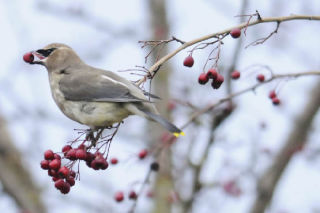Keep a green bough in your heart and the singing bird will come (Chinese proverb).
On a recent warm, lazy afternoon, I sat quietly in my back garden reading. A soft, high-pitched trill distracted me from my novel and I noticed two Cedar Waxwings hopping across the lawn. These clay-colored, 7 1/4-inch birds sport a head crest, black Zorro mask and bright yellow tail band. The tips of their secondary flight feathers look as if they have been dipped in crimson wax.
My quietude must have been enough of a “green bough” for them to come quite close. They appeared to be plucking something from the recently mowed weeds-that-we-call-lawn, which is unusual behavior for Cedar Waxwings; so I watched them closely.
Waxwings nest during June and July. Sugary fruits dominate an adult waxwing’s diet, but during the breeding season they collect protein-rich insects to feed their young. The two birds fluttered off into a stand of native Nootka roses, where I presume their nestlings were awaiting a regurgitated meal of insects.
Thank goodness we don’t use chemical pesticides. Just one granule of pesticide can kill a bird. Birds are attracted to the granules mistaking them for food or grit. I certainly wouldn’t want to harm these masked avian bandits.
Countless birds meet their deaths from direct or indirect exposure to landscape and agricultural chemicals. Direct poisoning occurs when a bird consumes a harmful substance or is sprayed. Indirect exposure occurs when a bird ingests an insect that has been poisoned.
Most of us are aware of the amazing comeback of bald eagles after DDT use was banned from agriculture during the mid 1900s. We now see eagles almost daily on Mercer Island. Cedar Waxwings have also experienced an increase in population during the last 20 years, likely for the same reason.
However, DDT isn’t the only chemical killer. In one observation in British Columbia, 52 Cedar Waxwings died and another 27 were partly paralyzed after consuming fruit from a tree sprayed with the chemical parathion.
Not only waxwings are victims of pesticide use. Robins, thrushes and other fruit eating birds, as well as the hundreds of species of insect-eaters including swallows, flycatchers and most all breeding songbirds are harmed. The problem is compounded during breeding season, when fruit and seed-eating bird species search out insects to feed their young. Most all baby songbirds are in jeopardy when pesticides are used near their nesting habitats.
If you have given up using pesticides on your home gardens, you might not think this discussion pertains to you. However, I invite you to consider your food-buying habits — I certainly had to.
How “green” is the green bough in our hearts?
If the food we consume was raised by an agribusiness that employs vast amounts of pesticides, wild birds likely have suffered. First, their habitat is often destroyed to develop large monoculture farms. Next, the birds’ insect food may be depleted with pesticides. Finally, the birds themselves may have been directly or indirectly poisoned.
The good news is that we now have a local alternative to consuming food based on pesticide-supported farming practices: Our new farmers’ market!
Buying certified organic produce is by far the safest purchase for our own health and the well being of wild birds. Some local farmers practice pesticide-free farming but haven’t been certified as organic. And some local farmers do use herbicides or pesticides. Ask about farming practices and pesticide use before you buy.
As I mentioned in my last article, my husband and I are thinking deeply about where our food-buying dollars are going. We are exploring local sources of dairy products, meats, grains and veggies. Our new flock of laying hens has just begun supplying us with fresh brown eggs.
We are struggling to make sound choices and are definitely slackers in many areas, but the more I learn about organic gardening methods and the benefit to ourselves, the growers and wildlife, the more convinced I am that we must support pesticide-free growing practices.
As far as I know, the insects in my back garden are toxin-free and I expect that soon I will see a healthy family of Cedar Waxwings following their parents across our lawn.
As the Chinese proverb says, if we “keep a green bough,” then the singing birds — waxwings included — will come.
Frances Wood can be reached at wood@whidbey.com. She is author of “Brushed by Feathers: A Year of Birdwatching in the West” (Fulcrum Publishing, Golden, Colo.,) available at local bookstores.



